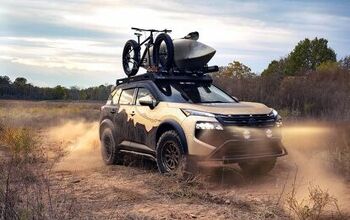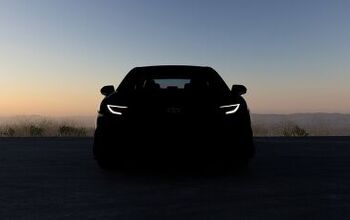IIHS: Hand-Held Cell Phone Bans Don't Work
The Highway Loss Data Institute, an affiliate of the Insurance Institutes For Highway Safety, reports that an audit of insurance claim filings shows no reduction in claim amounts in states with bans on cell phone use in cars. According to the report:
HLDI researchers calculated monthly collision claims per 100 insured vehicle years (a vehicle year is 1 car insured for 1 year, 2 insured for 6 months each, etc.) for vehicles up to 3 years old during the months immediately before and after hand-held phone use was banned while driving in New York (Nov. 2001), the District of Columbia (July 2004), Connecticut (Oct. 2005), and California (July 2008). Comparable data were collected for nearby jurisdictions without such bans. This method controlled for possible changes in collision claim rates unrelated to the bans — changes in the number of miles driven due to the economy, seasonal changes in driving patterns, etc.
Month-to-month fluctuations in rates of collision claims in jurisdictions with bans didn’t change from before to after the laws were enacted. Nor did the patterns change in comparison with trends in jurisdictions that didn’t have such laws.
Because the HLDI didn’t research phone usage to draw a causal connection between phone use and insurance claims, this study can’t prove whether hands-free phone use is as dangerous and handheld phoning while driving, or if the bans simply don’t limit the use of handheld phones while driving. Given the challenges of handheld phone ban enforcement and the fact that hands-free phone use hasn’t been proven to be less dangerous, either possiblity is equally likely. The HLDI concludes:
Whatever the reason, the key finding is that crashes aren’t going down where hand-held phone use has been banned. This finding doesn’t auger well for any safety payoff from all the new laws that ban phone use and texting while driving.
This ambiguity means more headaches for automakers like Ford, who hope to market hands-free capabilities like those enabled by the Sync system on fears of distracted driving. Had this study been able to find a link between hands-free laws and a decrease in insurance claims, that marketing angle might still have the strength of a fear factor behind it. But for every study like this that fails to conclusively prove the safety advantages of hands-free technology, the possibility grows that this technology will end up being seen as part of the problem rather than part of the solution.
More by Edward Niedermeyer
Latest Car Reviews
Read moreLatest Product Reviews
Read moreRecent Comments
- Rochester I'd rather have a slow-as-mud Plymouth Prowler than this thing. At least the Prowler looked cool.
- Kcflyer Don't understand the appeal of this engine combo at all.
- Dave M. This and the HHR were GM's "retro" failures. Not sure what they were smoking....
- Kcflyer Sorry to see it go. The interior design and color options in particular are rare in the industry
- Wolfwagen Here is my stable. not great not bad I try to do as much as possible. I work for an Aftermarket automotive parts company so I can get most parts at a discount.i try to do as much of my own work as possible. My wife hates that I spend time and money fixing the vehicles but she doesn't want car payments either so...2019 VW Atlas 50K (wife's) Only issues so far were Brakes and normal maintenance.A Bad Cat Converter which was covered and a replacement of the rear bank head gasket which was a manufacturing defect due to improper torquing at the factory. All under warranty2003 Saab 9-5 Arc Wagon (my DD) 116 K picked up used last year. Replaced Struts, brakes, hatch struts, motor mounts, D/S swaybar link, Timing belt, water pump and thermostat Power steering pump Fuel pump, Both Front window regular rollers, Heater core and cabin air filter. Oil and transmission changes. Love the car but Saab/GM packaging is a nightmare.2005 Cadillac Deville (former DD now Son # 1 DD) picked up used 5 years ago with only 47K now 83K Plugs, coils, P/s pump, Water pump, hoses, P/S lines (mechanic job) evap valve, brakes, Front brake calipers and rear brake calipers. Currently has oil pan gasket leak - looking to have a mechanic do that2009 Mini Cooper (Daughters dd)picked up 2 years ago 67K Brakes and thermostat house to clear check engine light2001 Mazda Tribue (Son#2 dd) 106K picked last summer after he severely damaged a 2004 Hyundai accent. Oil changes


































Comments
Join the conversation
I have never understood how people can drive and talk on the phone at the same time (never mind texting which blows me away). When I first got a mobile phone I tried to talk and drive but found it nearly impossible. So I used the speaker phone but it still felt inherently unsafe. I just knew deep down that I was moving very fast in something very heavy and should probably commit 100% of my attention to DRIVING. Talking can wait. But I seem to be in the minority. Am I just terribly uncoordinated (I’m bad at sports and even modern video games. I am good at Pac-Man)? Do I drive too fast? Do I enjoy driving too much? Am I too anti-social (it helps that I don’t actually LIKE to talk on the phone). What’s wrong with me?
80% percent of all rear end collisions (the most frequent vehicle accident) are caused by driver inattention, following too closely, external distraction (talking on cell phones, shaving, applying makeup, fiddling with the radio or CD player, texting, etc.) and poor judgment. I doubt if we'll ever stop the madness so I got one of these sparebumper.com to protect my family.